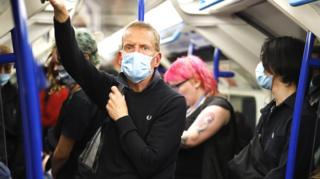 Image copyright
Getty Images
Image copyright
Getty Images
Face coverings are to become compulsory for people using public transport in England from Monday 15 June.
They are already recommended in some enclosed spaces - like public transport and shops - when social distancing (staying more than 2m apart) isn't possible.
What are the new rules?
The move to compulsory face coverings on buses, trains, ferries and planes will coincide with a further easing of lockdown restrictions.
From 15 June, ministers want more non-essential retailers to open and some secondary school pupils to return to classes. This could put more pressure on public transport, and make social distancing more difficult.
Announcing the new rules, Transport Secretary Grant Shapps stressed people should:
- Continue working from home if they can do so
- Avoid public transport if they can't work from home
- Avoid the rush hour if they have to take public transport
Some passengers will be exempt from the new rules:
- Young children
- Disabled people
- Those with breathing difficulties
Mr Shapps said passengers should wear "the kind of face covering you can easily make at home". Surgical masks should be kept for medical uses.
He told BBC News that while scientists aren't in full agreement about face coverings, "we think it's worth doing absolutely everything possible" to reduce the spread of coronavirus.
How will the new rules be enforced?
Mr Shapps said it would be a "condition of travel" to wear a face covering and people could be refused travel - and even fined - if they didn't follow the rules.
He said British Transport Police would enforce the regulation if necessary - but he hoped most travellers would comply.
Details of the rules will be displayed at stations. Transport staff will also wear face coverings, and volunteer marshals, known as "journey makers", will give advice.
What's the current advice?
Until now the government advice in England has said you should wear face coverings:
- On public transport and in some shops, where social distancing can't be observed
- In other enclosed spaces where you come into contact with others you don't normally meet
It also stresses that personal face coverings:
- Do not replace social distancing - which should still be observed
- Should not be confused with surgical masks or respirators, which should be left for healthcare staff and other workers who need them
- Should not be worn by very young children or people who have problems breathing while wearing a face covering
What about the rest of the UK?
In Scotland, it is recommended that you consider using face coverings in limited circumstances - such as public transport - as a precautionary measure.
In Northern Ireland, people should have face coverings in enclosed spaces for short periods of time, where social distancing is not possible.
Currently, the Welsh government does not ask for people to wear non-clinical face coverings - saying it is a "matter of personal choice".
Why doesn't everyone wear a mask now?
The World Health Organization (WHO) currently says only two groups of people should wear protective masks, those who are:
- sick and showing symptoms
- caring for people suspected to have coronavirus
It says medical masks should be reserved for healthcare workers.
Masks are not generally recommended for the public because:
- they can be contaminated by other people's coughs and sneezes, or when putting them on or removing them
- frequent hand-washing and social distancing are more effective
- they might offer a false sense of security
But that doesn't mean they have no benefit at all for the general public - it's just that the scientific evidence is inconclusive.
Homemade cloth face-coverings can help reduce the risk of transmission in some circumstances - they might help stop the spread of coronavirus by people who are contagious but have no symptoms (known as asymptomatic transmission).
Coronavirus is spread by droplets that can spray into the air when those infected talk, cough and sneeze. These can enter the body through the eyes, nose and mouth, either directly or after touching a contaminated object.
What face masks are used by health workers?
The most protective mask is an FFP3 or, alternatively, an N95 or an FFP2.
NHS staff in lower-risk situations can wear a surgical mask. This includes healthcare workers within one metre of a patient with possible or confirmed Covid-19. These staff may be in hospitals, primary care, ambulance trusts, community care settings and care homes.
Where am I supposed to get a face covering?
There is lots of advice online about how to make them.
Suggestions include using common household items, such as cotton fabric from old T-shirts or bedding.
The government has published advice on how to wear and make your own cloth face covering which says:
- A cloth face covering should cover your mouth and nose while allowing you to breathe comfortably
- It can be as simple as a scarf or bandana that ties behind the head
- Wash your hands or use hand sanitiser before putting it on and after taking it off and after use
- Avoid touching your eyes, nose, or mouth at all times and store used face coverings in a plastic bag until you have an opportunity to wash them